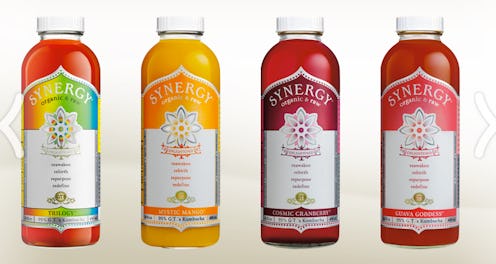News
Wait, These Drinks Are Alcoholic?

On Thursday, Kirsten Chilstrom of VICE wrote a fascinating article about the alcoholic properties of kombucha, that miracle tea drink that some claim (hi, Lindsay Lohan) contains a myriad of health benefits — including perhaps, a cure to alcoholism. But as Chilstrom points out, kombucha is not so much a "cure" as it is a replacement: Some varieties of the fermented black tea actually contain more than 0.5 percent alcohol, the legal line in the sand imposed by the Food and Drug Administration separating the booze from the non-booze.
In 2010, Whole Foods and other previous carriers of kombucha pulled the product from their shelves following revelations that certain strains of the product exceed the 0.5 percent limit nearly six times over, with some kinds of kombucha containing up to three percent alcohol. For reference, a bottle of Beck's Lite contains just 3.8 percent alcohol, and Miller Genuine Draft 64 contains even less at 2.8 percent alcohol.
Given that kombucha had always been marketed as a non-alcoholic drink, buyers and sellers everywhere were a bit taken aback when they discovered that they could've gotten a better buzz off their tea than their beer.
Kombucha is produced by way of fermentation, and as ABC News explains, a "fungus of yeast and bacteria" is given several weeks to ferment in sugary tea, which yields a slightly alcoholic result that has a distinctly vinegary taste. Yummy. Juice is then added to the tea to offset its naturally less-appealing flavor.
In order to maintain the health benefits of kombucha, producers often keep it unpasteurized, and with the raw food craze sweeping the nation, this may even contribute to the appeal of the drink. Unfortunately, raw kombucha continues to ferment unless it is refrigerated, which means that the trace amounts of alcohol that the beverage begins with can multiply to much, much higher levels.
After the 2010 incident, Kombucha manufacturers decided to market different kinds of their product to both the under and over-21 crowd, with some strains of the drink containing less than 0.5 percent alcohol, and others doubling as beer-like teas.
In light of this discovery, we thought it might be worth exploring what other unwittingly-alcoholic drinks we might be imbibing. With the standard for alcohol being set so low, you might be surprised at just how much booze you're accidentally drinking on a day-to-day basis.
Kvass
If you're a foodie (or a drinkie), this is one drink that's definitely making an entrance in the United States, with its entrance point being none other than Brooklyn, New York. Kvass has been a favorite of Russians and other eastern European nations' inhabitants for over a thousand years. Made by rye bread, beets, or even lettuce, the taste of kvass is described by The New Yorker as "a blend of cider, wine, and soda pop." Sign us up! For some, kvass is an alternative to Coca-Cola, but with one notable exception — kvass contains up to 1 percent alcohol. And while this may be alright for the Russians, the American FDA would have a few more issues with this version of coke.
Kefir
Bad news if you're a drinkable yoghurt lover — Kefir, a fermented milk product, also contains about 1 percent alcohol, which is above the legal limit. Kefir grains, which are not grains but in fact a mixture of yeast and bacteria, are added to either milk or water and juice, producing a probiotic beverage. Known for its fast fermentation time, kefir can be made in just 24 hours, although allowing it to ferment for longer will increase its alcohol content.
Juicing Gone Bad
If you're attempting to do all your own juicing at home, be warned, you might end up making some homemade alcohol instead of a cleansing regiment. After all, most alcohols are nothing more than fermented fruit. Moreover, the liquid left over from pickling vegetables is sometimes kept for its probiotic qualities, but again, it does contain just a bit of alcohol. Allowing it to continue fermenting will only increase its alcoholic properties, so be careful!
Sweet Potato Fly
A must-have for this Thanksgiving. Who knew our favorite version of the potato had so many different applications? Same story for this one guys, if you ferment it, it will contain a little bit of alcohol, probably in and around 1 percent. Sweet potato fly isn't quite widespread enough to be carried by Whole Foods (yet), but if it ever catches on, this could be the next kombucha.
Images: Getty Images (3), GTs Synergy Kombucha (2)